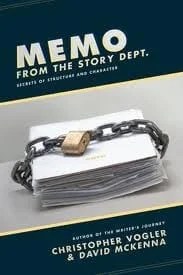Memo From The Story Dept. by Christopher Vogler and David McKenna (book review).
Still under my pursuit of what can be learnt from scriptwriting that can be applied to prose writing, ‘Memo From The Story Dept.’ by Christopher Vogler and David McKenna gives the perspective of the story or film script analysis. Both Vogler and McKenna have worked in and taught how to strip a story down and work out what is missing and put the scriptwriters back on course. I might not do this in quite the same way they do it when I examine prose samples but I can see what they are getting at.
Although the date isn’t given and even its writer, Vogler, himself had difficulty finding an original copy of ‘The Memo’ that he prepared for the studio he was working for that spread across Hollywood and which is included here. Reading it here, it is a distillation of Joseph Campbell’s ‘The Hero Of A Thousand Faces’ and its plot structure. We all know that George Lucas had earlier used it as the basis for the first (or fourth, depending on how you look at it) ‘Star Wars’ film and is part of the example used. Reading it, I couldn’t help but feel that points 6 to 9 could also be used as the euphony for Han Solo’s own motivation to stay involved in the story.
Vogler’s speciality is more with the characters and his distillation of Theophratus’ ‘The Characters’ where the ancient Greek had wandered through the market square identifying thirty different characters is very enlightening. If you want to make a mix and match of personality traits, this should give some interesting selections. Vogler even encourages you to look for modern day equivalents although I suspect these will keep you busy enough.
Something I hadn’t been aware of before was the logline which McKenna points out an entire film plot is described in one line. This is not so much the story but the basics before getting onto a brief summary. Here, Vogler differs from his co-writer, pointing out that three lines can be justified.
The examination of plot details taken from Russian folk tales by Vladimir Yakovlevitch Propp should also be of interest to those of you who want to come up with something different. Interestingly, they are very much akin to what we see in this side of the world which tends to make me think plot-lines are global than specific to one society.
Something that should make you think is the examination of environmental factors that have an effect on the story. With SF, we always take the date into consideration, but McKenna reminds us also of location, society, religion, political and economic environments as well. They all shape our realities and even though he’s using general genre, it does raise some interesting thoughts on how they affect the plot of any story. I would also add weather conditions and time of days as well if only because so often writers tend to have adventures of sunny days. Environment changes a lot of things in a story and the more natural obstacles you can introduce into a story, I suspect you will get the reader to share what the characters are going through.
Something rather telling in selling a story to a publisher, McKenna learnt from Stan Lee in ‘Sell the sizzle, not the bacon’. Basically, don’t get bogged down in the details when outlining a plot. If you learn nothing else from this book, then this one should sink in the most.
They also give some good advice for any aspiring writer to find the kind of job that they can work their writing around, although whether it would work that way around all parts of the world, I’ll less sure about.
As always, you can tell from the length and content of the review how much I learnt from reading this book. I suspect those of you aspiring to write as well as those of you who do write will find a lot to consider here as well. If you only learn a little about character types and environmental problems to imbed into your stories then you will have learnt a lot from this book.
GF Willmetts
February 2014
(pub: Michael Wiese Productions. 253 page enlarged paperback. Price: $26.95 (US), £ (UK). ISBN: 978-1-932-907-1)
check out websites : www.mwp.com and www.thewritersjourney.com



